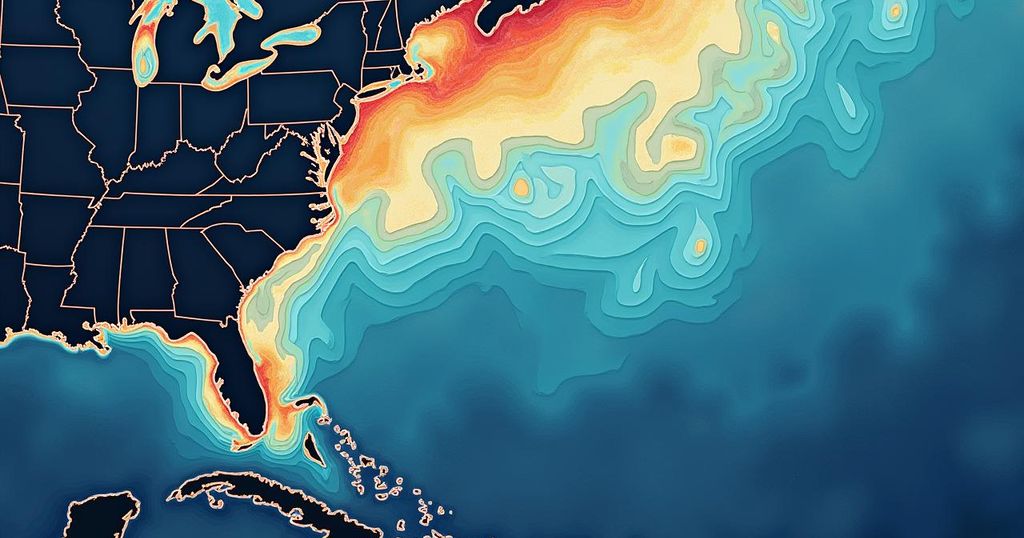Hurricane Kirk Could Threaten East Coast with Surf and Rip Currents This Weekend
Hurricane Kirk, a Category 3 storm, is moving toward the U.S. East Coast, posing risks of dangerous surf and rip currents this weekend. It is expected to strengthen and impact various regions, following significant devastation caused by Hurricane Helene. The ongoing hurricane season has seen numerous storms already, raising concerns for coastal safety and emergency responses.
Hurricane Kirk, classified as a Category 3 storm, is advancing toward the East Coast from the Central Atlantic and is anticipated to pose considerable risks this weekend, particularly concerning dangerous surf conditions and rip currents. According to the National Hurricane Center, Kirk is progressing northwest toward North America, and while it is unlikely to make landfall, it is expected to generate significant ocean swells. These swells are projected to reach the Leeward Islands, situated east of Puerto Rico on Friday, followed by Bermuda and the Greater Antilles on Saturday. By Sunday, the east coast of the United States and the Bahamas may experience the impacts of these ocean swells. Furthermore, Hurricane Kirk is forecasted to escalate as wind speeds could potentially soar to 140 mph by Friday afternoon, which would elevate it to a Category 4 storm. Hurricane Kirk marks the 11th named storm of the current Atlantic hurricane season, occurring merely a week subsequent to the landfall of Hurricane Helene on September 26. Meteorological predictions for this year have suggested an exceptionally active hurricane season, with the National Oceanic and Atmospheric Administration (NOAA) estimating the occurrence of up to 25 named storms and 13 hurricanes between June 1 and November 30. Thus far, the season has recorded seven hurricanes, which include Beryl, Debby, Ernesto, Francine, Helene, Isaac, and Kirk, alongside five named tropical storms, namely Alberto, Chris, Gordon, Joyce, and Leslie. In light of recent devastating hurricanes, the death toll attributable to Hurricane Helene, which impacted the Gulf Coast of Florida, continues to rise. Initially striking as a Category 4 storm, Helene caused extensive devastation across Florida and Georgia, ultimately reaching eastern Tennessee and western North Carolina. Communities such as Asheville, North Carolina, have been severely affected, with floodwaters leading to significant infrastructure damage, resulting in the tragic loss of more than 50 lives in Asheville alone. Across six southeastern states, the overall fatality count from Hurricane Helene has surpassed 180, rendering it one of the deadliest hurricanes since Katrina. The urgency of recovery efforts has prompted President Joe Biden to deploy up to 1,000 active-duty military personnel to assist the North Carolina National Guard. Presently, approximately one million individuals remain without electrical service across Florida, Georgia, South Carolina, North Carolina, and Virginia, as indicated by PowerOutage.US. Additionally, another weather system has emerged, identified as Tropical Storm Leslie, located about 500 miles southwest of the Cabo Verde Islands. Projections suggest that Leslie may strengthen into a hurricane in the forthcoming days; however, there are no active watches, warnings, or imminent threats to land as of now.
Hurricane Kirk is currently a Category 3 storm traveling westward in the Central Atlantic. The National Hurricane Center has issued warnings regarding potential impacts, particularly concerning hazardous surf and rip current conditions that could jeopardize safety along the U.S. East Coast. Kirk follows Hurricane Helene, which had significant impacts just the previous week, highlighting the challenges presented during an anticipated busy hurricane season as predicted by NOAA. This current hurricane season has already set a high record with several named storms and hurricanes, intensifying concerns for coastal regions and emergency response efforts in the aftermath of recent storms that have caused widespread devastation and loss of life.
In conclusion, Hurricane Kirk poses substantial risks to the East Coast this weekend, with anticipated dangerous surf and potential rip current conditions. As the storm progresses, preparations are essential to mitigate the impact of the swells, particularly following the devastating effects of Hurricane Helene. The ongoing hurricane season remains a concern, emphasizing the need for vigilance and readiness among coastal communities.
Original Source: www.forbes.com




Post Comment